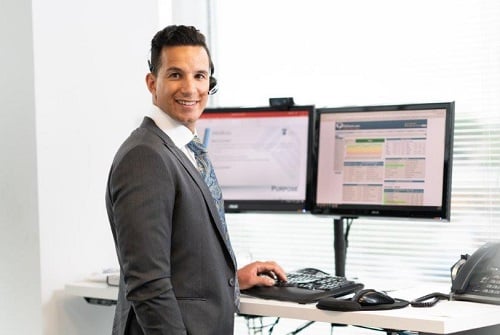Portfolio manager on leveraging technology, surrounding himself with a top team and why it’s vital to simplify wealth management for clients

Maximising technology is central to Nader Hamid’s ambition to grow and continuously enhance his client-centric practice.
The Montreal-based advisor enjoyed a stellar year in 2018, increasing his book size by 77% to $265 million through both acquisitions and organic growth. He spoke to WP about what sparked his holistic approach, and why having a gifted team, and agile systems and processes, are key to his firm’s future.
The portfolio manager and director at Total Wealth Management Group, HollisWealth, said his strategy is simple: to continuously improve all processes whether it’s portfolio management, the team, or the client relationships and touch points. It’s a challenge he meets head-on daily.
He said: “One of our success factors is the application of technology and using it to streamline and scale our processes. We are currently using a highly customised version of a CRM that we have made modifications to in order to properly service our clients.
“We use other analytics tools, communication tools and project management tools – all to increase the agility. Having a large team to delegate a lot of the process to allows me to focus on client relationships and the portfolio management, financial planning piece.”
Hamid’s passion remains undimmed after 17 years in the industry, which he entered not long after the tech bubble burst. Back then, he found there was too much emphasis placed on stock picking and not enough time spent helping individuals reach their unique goals. He took a step back, therefore, and built a practice that took a more holistic approach.
“I’ve always been fascinated by the market but also by human behaviour, making things more efficient and getting people to their objectives,” he said.
“That’s one of our main things – our success is that we really help our clients reach their objectives with peace of mind but also help them through transitions and difficult periods.”
 He added: “One of the reasons I got into this business is because it is a perfect marriage between the financials and the analysis side but also the human touch and the relationship side.”
He added: “One of the reasons I got into this business is because it is a perfect marriage between the financials and the analysis side but also the human touch and the relationship side.”
One of the team’s mottos is Health, Wealth and Happiness, with wealth the bridge, and Hamid wants clients to not only have the money to retire but also the knowledge to make good decisions and to do so comfortably.
This involves education through seminars, newsletters and blogs. It also requires TWM to have an exceptional team flanking Hamid and it’s an aspect he believes is a key reason for the practice’s success.
“Everyone uses their unique abilities to maximise their potential and provide an excellent service,” he said. “I have a phenomenal partnership with portfolio managers Jean Henault, who has been a mentor to me, and Pascal Ricard, who is an associate.”
The three are keen followers of Ray Dalio’s principles, which helps them brainstorm and generate new ideas to improve client service. Hamid also heaped praise on administrative services manager Vanita Batra, the "backbone" of the whole operation, Lily Yan and Tessa Wong for their administrative expertise, and Chelsea Parasuco and Olivier Jean, who specialise in research and portfolio management.
He said: “[The team] really allows me to focus on my passions and strengths, which are portfolio management, financial planning and client relationships. Being well-surrounded by people that are specialists in other areas, that’s been one of the reasons for our success.”
It’s a way of working that helps Hamid fulfil one of his core objectives for clients – to simplify the wealth management experience; let the experts take care of the details and complexities, and take that burden away.
To achieve this financial road map for clients, Hamid uses a pension-like approach to investment, utilising discretionary access to things like private equity, customised products, private debt and real estate to diversify a portfolio.
He said: “We think it’s important in terms of diversifying away from traditional plain vanilla balanced funds. It’s much harder to make and generate yield than it was 20 years ago with the interest-rate environment.
“We are approaching the end of the business cycle, so it’s extremely important to think a little outside the box, to manage money for the individual similarly to how institutions and pension funds have a long-term view and to diversify into these asset classes.”



